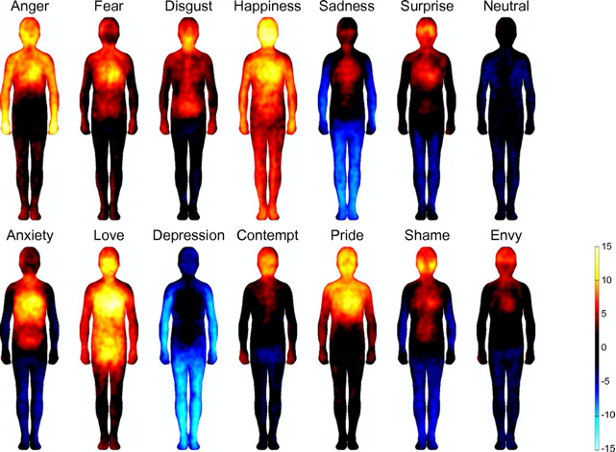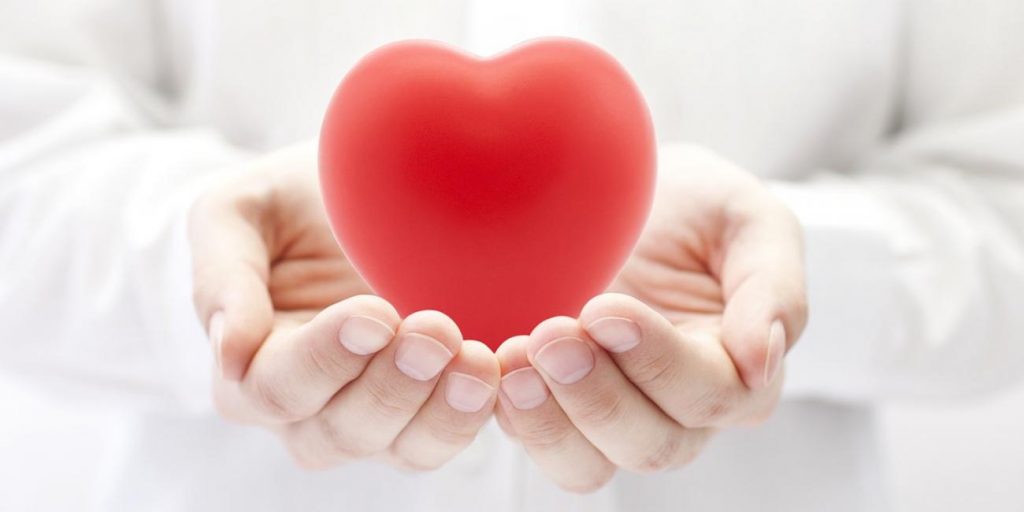“Reflecting on your emotional state changes how your heart works when you’re angry.”
“We experience emotions directly in our bodies. Remember strolling through the park to meet your sweetheart—you walk lightly with your heart pounding with excitement. Or remember anxiety tightening your muscles and making your hands sweat and tremble before an important job interview.” These are the opening lines of a scientific paper from a group of Finnish researchers, who took a closer look at body sensation patterns that occur when we exhibit different emotions.

Looking at the body maps the researchers generated by studying 700 participants, you immediately notice the regions with increased activation (warm colors) or decreased activation (cool colors) when feeling each emotion. What I find really interesting is that almost every emotion (except for disgust, depression, and contempt) was associated with strong sensations in the upper chest area—the heart!
“This is wisdom as old as the hills”, you might think—and you are absolutely right. Somehow, long before the scientists could create fancy, colorful body maps of emotions, we intuitively knew this. There must be a reason that you “lose your heart” to someone who doesn’t love you, then you are “heartbroken”. If you decide to “pour your heart out” to a friend, her “heart bleeds for you”. Our language reveals how we feel, and it is clear we have felt for a long time that the heart is the center of a person’s emotions.
All the love songs and emphasis on the heart actually makes sense. This is great, isn’t it?
Well, not always. Having your heart strongly responding to emotions can mean bad news—says another research study. According to their research, your heart can experience the same damage from hearing really bad news and letting your emotions take over as that of a 300-pound boxer punching you in the chest. And it seems that we intuitively knew this too. Expressions like “died from fright” and “worried to death” are not just hyperbole—they are physiologic possibilities. So our heart is the physical center of our emotions, but we can hurt it if we experience a load of negative emotions (brilliant idea mother nature?!)
Because life, or sh*t, happens, we can’t always avoid the unwanted sequence of events where something bad happens, we freak out, stress hormones overflood our bodies, and our heart must deal with it. Sometimes the pile of sh*t is just too big and we can’t really do much but be indulged in emotions completely, such as when we lose a loved one.
Even more worrying are the many situations that aren’t that dramatic, and yet we still let them profoundly trigger our hearts.
Don’t know what I’m talking about? Just remember your reaction when that idiot turned left and you had the-right-of-way. Or that terrible human being of a bus driver who didn’t wait for you, but saw you sprinting Forest Gump style for the last two blocks. Oh, and let’s not forget the lazy retail worker who was so rude and just couldn’t get the job done but made you come back another day. This kind of stress is happening often and its cumulative effect is quite dangerous for our hearts.
Is there anything we can do to protect our heart when we’re getting into a Godzilla mode about not-that-dramatic events? The answer is YES.
According to a study published in the open-access journal PLOS ONE, it’s not even that complicated or difficult to protect your heart. “Reflecting on your emotional state changes how your heart works when you’re angry”, said study author Karim Kassam, Ph.D., of the Department of Social and Decision Science at Carnegie Mellon University in Pittsburgh, PA. “Being aware of your emotional response is a good thing. It positively affects you, whether you are aware of it [the positive effects] or not.” Kassam said. “As thoughts change, so too does physiology.”

I know a young lady who used to get really upset when her family or friends would lose things; all kinds of things, a notebook from biochemistry classes, keys, cellphones, plane tickets, or (God forbid) a wallet with personal documents. The loss of simple items would trigger an unbelievable transformation – remember what happens when mogwai eats after midnight? She reported later that she felt her heart rate soaring, her negative emotions heating up, and then very quickly something truly poisonous came out of her mouth (not helping the development of the situation in any way). After many years of self-reflection and coaching, this young lady finally understood the traumatic childhood experience that created this pattern.
When she was 10 years old, someone stole her wallet while she rode the train. Unfortunately, her ID was in the wallet and she needed it the next day for the most important tournament of the year—the national junior championship. In the midst of her despair, her coach sat her down in a room full of her teammates and told her that she didn’t deserve to compete at the championship because she was so irresponsible (for the record, she hadn’t missed a single practice since she started playing in the club and had never lost her important belongings before). He told her that she needed to be punished. She cried and cried and cried. And her coach told her that she should cry because it was entirely her fault that she would not compete tomorrow.

When she connected the dots and understood the real trigger, she was able to do what Dr. Kassam suggested. She was finally able to reflect on her feelings, virtually hug her 10-year old self, change her reaction to her friends and family, and most importantly, protect her heart. It makes me incredibly happy and proud when I see her reacting with awareness and controlling her previous impulses. And if you think this is an example from a client—ah well, you don’t have to know everything 😉.
